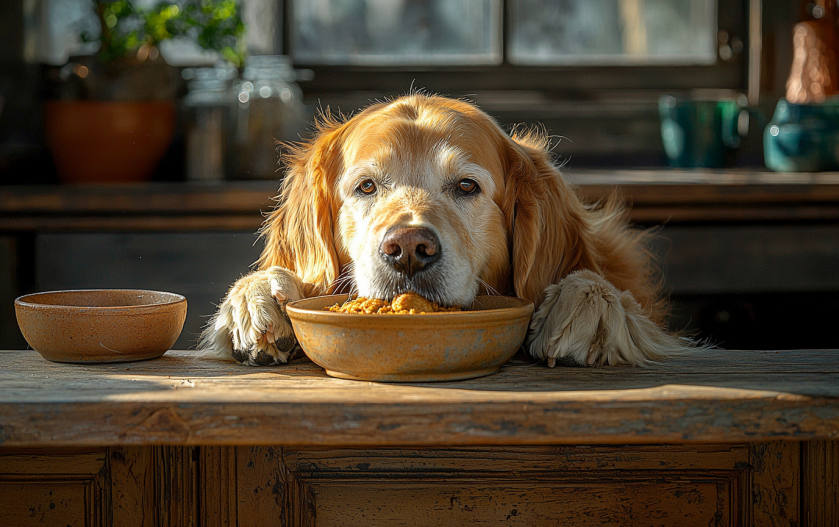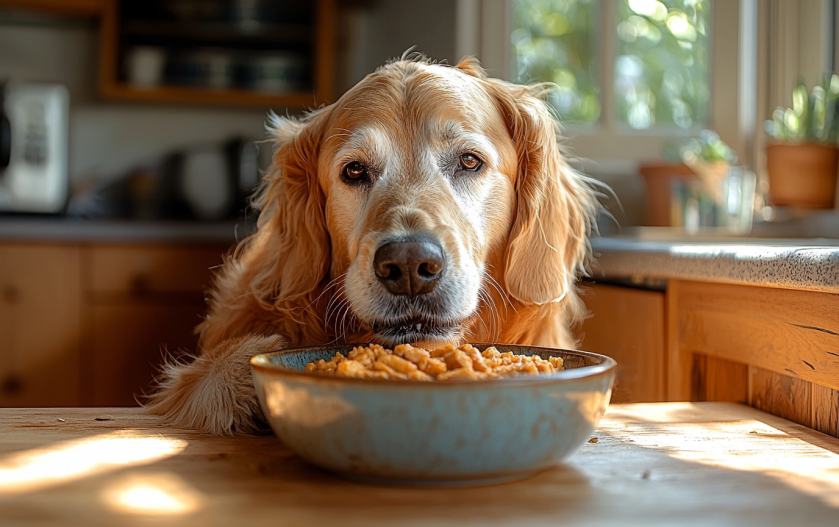Why Senior Dogs Have Special Dietary Needs
Just as puppies need specific nutrients to grow, senior dogs require food that addresses their aging bodies. As dogs age, their metabolism slows down, making them more prone to weight gain. They may also develop joint problems, weakened immune systems, or digestive issues. Their muscle mass can decline, and they may experience cognitive dysfunction.
These changes necessitate adjustments in their diet. Senior dog food is often lower in calories to account for slower metabolism but still packed with vital nutrients to support joint health, immune function, and muscle maintenance. This balance can help prevent obesity and other conditions that are common in older dogs.
Additionally, senior dogs might have dental issues, which makes the texture and type of food important. Wet foods may be easier to chew than dry kibble, for example.
Key Nutrients for Senior Dogs
To maintain a senior dog’s health and vitality, it’s important to focus on certain key nutrients that address their specific needs. Here are the top nutrients to look for in senior dog food:
Protein
Protein is essential for maintaining muscle mass in aging dogs. A good senior dog food will have high-quality, easily digestible protein sources like chicken, fish, or lamb. As dogs age, they can lose muscle, leading to weakness and mobility issues. Ensuring they have enough protein helps counteract this process.
Omega Fatty Acids
Omega-3 and omega-6 fatty acids are crucial for reducing inflammation and promoting joint health. These fatty acids can also help maintain a healthy coat and skin, which can become dry and flaky as dogs age. Fish oil is a common source of omega fatty acids in senior dog food.
Fiber
Fiber plays an important role in digestion, and senior dogs often suffer from gastrointestinal issues. Foods high in fiber can help regulate bowel movements and prevent constipation, which is a common issue in older dogs. Look for natural sources of fiber, such as brown rice, sweet potatoes, or peas.
Vitamins & Minerals
Vitamins and minerals are essential for keeping your dog’s immune system strong and supporting bone and joint health. Senior dog food should include adequate amounts of calcium and phosphorus for bone health, as well as antioxidants like vitamins C and E to support the immune system.
READ ALSO: Puppy Dog Food 101: Essential Nutrients and Feeding Tips
Common Health Issues in Senior Dogs and How Diet Helps

Aging dogs commonly experience certain health issues, many of which can be managed or alleviated through proper nutrition. Let’s explore some of the most common health concerns in senior dogs and how the right food can help.
Joint Health
Arthritis and joint pain are prevalent among senior dogs, especially larger breeds. Senior dog foods often include glucosamine and chondroitin, which are supplements known to support joint health and reduce inflammation. Additionally, omega-3 fatty acids can help minimize pain from arthritis and improve mobility.
Digestive Health
Senior dogs may experience slower digestion and more sensitive stomachs. A diet high in fiber and easy-to-digest proteins can help regulate their digestive system. Probiotics are also often added to senior dog foods to promote gut health and aid in digestion.
Weight Management
With a slower metabolism, senior dogs can easily gain weight, leading to obesity, which further complicates joint problems and can increase the risk of diabetes. Low-calorie senior dog foods are formulated to help maintain a healthy weight while still providing all the necessary nutrients. Weight management formulas often have added fiber to help your dog feel full without overfeeding.
Senior Dog Food: Wet vs. Dry
When it comes to choosing between wet and dry food for senior dogs, there are pros and cons to both. Here’s a quick breakdown:
Wet Food
- Pros: Easier to chew, especially for dogs with dental issues; higher moisture content, which is beneficial for dogs prone to dehydration; often more palatable and enticing to picky eaters.
- Cons: More expensive than dry food; can spoil quickly once opened; doesn’t offer the same dental benefits as dry kibble.
Dry Food
- Pros: More affordable and longer-lasting; can help clean teeth and reduce plaque buildup; generally contains more fiber.
- Cons: Harder to chew for dogs with dental issues; may be less appetizing for older dogs with reduced senses of taste or smell; can be lower in moisture, leading to dehydration.
Ultimately, the choice between wet and dry food may depend on your dog’s specific needs and preferences. Some pet owners opt for a mix of both, offering dry kibble with occasional wet food to keep meals interesting.
How to Choose the Right Senior Dog Food

Now that we understand the needs of senior dogs, here’s how to choose the right food for your pet:
Reading Labels
When choosing senior dog food, always read the ingredient list carefully. Look for real meat (like chicken or beef) as the first ingredient, avoid artificial additives, and make sure the food has a balanced nutrient profile with sufficient protein, fiber, and healthy fats. Avoid foods with fillers like corn and soy, which don’t offer much nutritional value.
Understanding Ingredients
Knowing what ingredients to prioritize will help you make an informed decision. Look for:
- Glucosamine & Chondroitin: Supports joint health.
- L-Carnitine: Helps with fat metabolism, supporting weight management.
- Probiotics & Prebiotics: Encourage healthy digestion.
- Antioxidants: Promote a healthy immune system.
Top Senior Dog Food Brands Recommended by Veterinarians
When it comes to senior dog food, there are several brands that stand out for their high-quality ingredients and formulations tailored to aging pets. Some of the most recommended brands by veterinarians include:
- Hill’s Science Diet: Known for their scientifically backed formulas, Hill’s Science Diet has a range of options specifically for senior dogs, including those with mobility issues or weight concerns.
- Royal Canin: Offers breed-specific and size-specific formulas, ensuring that your dog gets tailored nutrition based on their age and size.
- Blue Buffalo: Offers high-protein, grain-free options with natural ingredients and added antioxidants for senior dogs.
- Purina Pro Plan: A trusted brand with specialized formulas for senior dogs, particularly those needing weight management or joint support.
- Wellness Complete Health: Known for using all-natural ingredients, Wellness has senior dog foods with added vitamins and minerals to support immune health.
How to Transition Your Dog to Senior Food
Switching your dog’s food to a senior formula requires a gradual transition to avoid upsetting their stomach. Here’s how to do it:
- Start by mixing 25% of the new senior dog food with 75% of their current food.
- Over the course of a week, gradually increase the amount of senior dog food while decreasing the old food.
- By the end of the week, your dog should be fully transitioned to the new food.
If your dog experiences any digestive upset, such as diarrhea or vomiting, slow down the transition process.
Homemade Senior Dog Food: Is It a Good Idea?
While many dog owners prefer to prepare homemade meals for their dogs, it’s essential to understand the risks and benefits of doing so for senior pets. Homemade diets allow you to control exactly what goes into your dog’s meals, but it can be challenging to ensure they get all the necessary nutrients.
If you choose to make homemade senior dog food, it’s crucial to consult with a veterinarian or a pet nutritionist. They can help you create a balanced meal plan that includes all the vitamins, minerals, and nutrients your dog needs.
Supplements to Support Aging Dogs
In addition to their regular food, some senior dogs benefit from added supplements to support their health. Common supplements for senior dogs include:
- Glucosamine & Chondroitin: For joint health.
- Omega-3 Fatty Acids: For inflammation and coat health.
- Probiotics: To support digestion.
- L-Carnitine: For weight management.
- Antioxidants: To support the immune system and combat the effects of aging.
Signs Your Senior Dog Needs a Dietary Change

It’s important to monitor your dog’s health as they age. If you notice any of the following signs, it may be time to change their diet:
- Weight Gain: If your dog is gaining weight despite a consistent diet, they may need a lower-calorie senior formula.
- Joint Stiffness: If your dog seems stiff or has difficulty getting up, consider switching to a food that contains glucosamine and chondroitin.
- Digestive Issues: Frequent diarrhea, constipation, or vomiting may indicate that their current food isn’t agreeing with them.
- Lethargy: If your dog seems unusually tired or less active, their diet may not be providing them with enough energy or the right nutrients.
Conclusion: Supporting Your Aging Pet’s Health with the Right Nutrition
Choosing the right senior dog food is a crucial part of caring for your aging pet. By focusing on the key nutrients that support joint health, digestion, weight management, and overall well-being, you can help your dog live a healthier, happier life.
Whether you opt for wet or dry food, or even homemade meals, ensuring that your dog gets the right balance of protein, healthy fats, fiber, and essential vitamins is essential. Keep an eye on your senior dog’s health, and don’t hesitate to adjust their diet as needed with the help of your veterinarian.
With the right nutrition, your senior dog can continue to enjoy their golden years in comfort and happiness.





